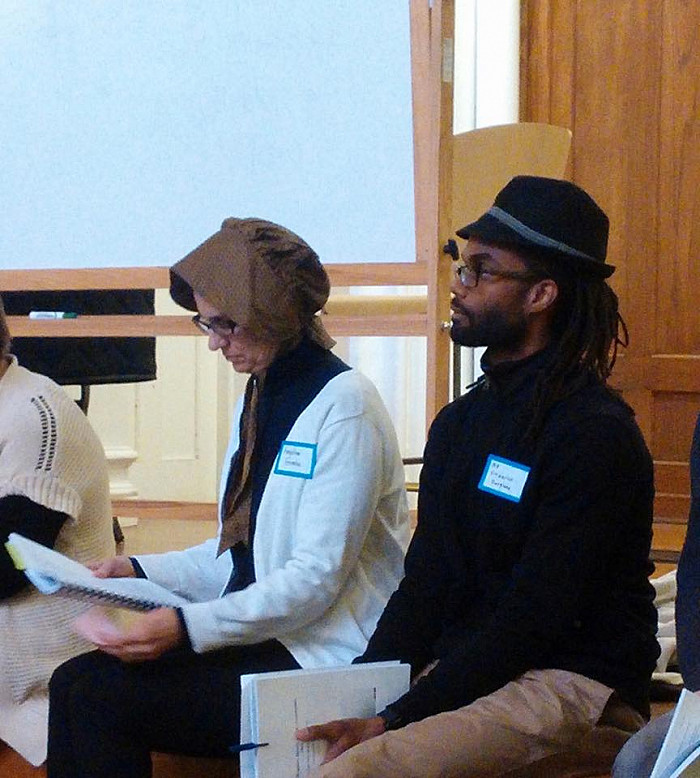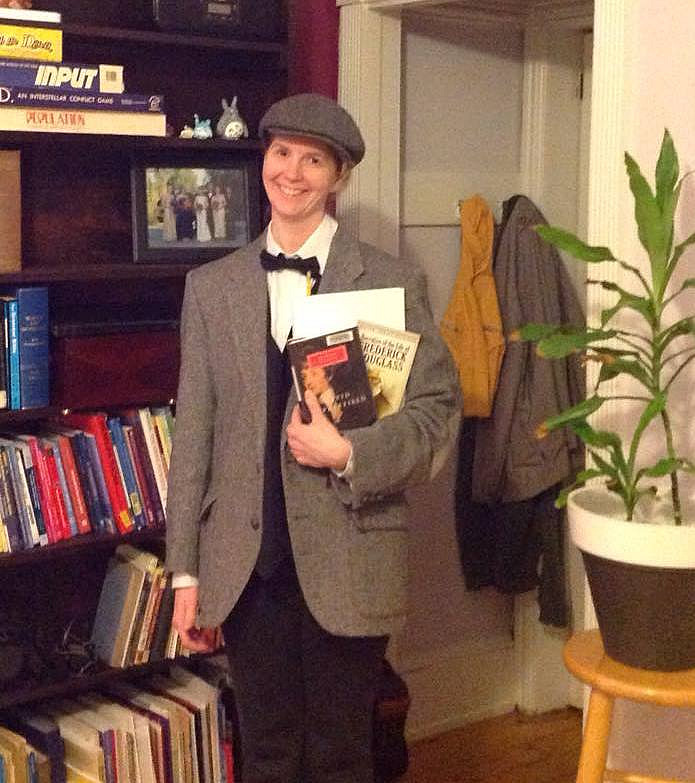Profs Become Historic Characters to Enhance Teaching
It’s 5:30 p.m. on a Friday night in early February. Campus is quieter than usual—the cold weather chasing most students indoors. Even Main Street is uncharacteristically hushed—free of the usual rush hour traffic. A warm amber light illuminates the windows of Bomberger Hall. Inside, 31 professors and a handful of students mill about the auditorium, forming small, informal groups and quietly chatting.
Professors Meredith Goldsmith, Jennifer Fleeger and Yvonne McCarthy stand in a huddle on the side of the room.
Fleeger, wearing a tweed Jeff cap, men’s blazer and bowtie, asks McCarthy, “Do you have a wife?”
“I do… I’m married to my cousin,” replies McCarthy in an old-fashioned British-American accent.
The professors chuckle.
Suddenly, the only outsider in the room stands on the stage and bellows, “Five more minutes to get into character and then we move on to the next exercise.”
It’s Dr. Mark Higbee, a professor of history at Eastern Michigan University. As Dr. Higbee steps down and resumes chatter with another group of professors, one of whom wears a very tall top hat, it becomes clear: this is not a typical modern-day faculty meeting. The costumes, the antiquated accents, the first-cousin marriage… this is a “Reacting to the Past” workshop, for which Bomberger Hall has been transformed into a time machine, and the year is 1845. McCarthy is playing the role of American writer Edgar Allen Poe, who married his first cousin Virginia Clemm when she was 13.
Reacting to the Past (RTTP) is a teaching methodology pioneered by Mark C. Carnes at Barnard College in the 1990s that has been implemented at over 300 colleges and universities in the U.S. and abroad. RTTP consists of elaborate games, set in the past, in which participants are assigned roles informed by classic texts. Ursinus College joins the RTTP consortium in 2016.
During the RTTP workshop organized by the Teaching and Learning Institute on Feb. 5 and 6, Ursinus professors learned and applied this exhilarating teaching method. RTTP teaches students to read and analyze texts, learn about central debates in the history of ideas, understand different and opposing viewpoints, and how to formulate and communicate persuasive arguments—all in the guise of a game.
To prepare, participating professors received information about his/her assigned historic figure as well as a number of key historical texts, studied their role’s goals and values and embodied their roles during a giant role-playing game that took place in the year 1845 and centered around Frederick Douglass, slavery, abolitionism and the Constitution.
“The goal of this workshop is to provide Ursinus faculty the opportunity to learn the pedagogy by experience, just as the pedagogy itself asks students to learn by experience” said Susanna Throop, professor of history and coordinator of the Teaching and Learning Institute.
At the workshop, characters fell into one of three groups: abolitionists, defenders of the Constitution, and independents. Conversations were spirited as characters from each group argued their ideologies to a sometimes raucous crowd with differing ideals. At one point, Professor Nzadi Keita playing the role of African-American poet and activist Frances Ellen Watkins was nearly booed off the stage by a group of dissonant defenders of the Constitution. True to history, Watkins stood steadfastly at the podium as the crowd eventually quieted and allowed her to speak.
“Reacting to the past seems especially suited to a place like Ursinus,” said Mike Mackintosh, professor of history. “Students not only learn an immersive lesson about the subject matter, but they also get experience in negotiation, comprehension of other viewpoints, group management, self-motivation, persuasion and perseverance in the face of frustration.” Official RTTP class sessions are run entirely by students in accordance with the structure of the assigned game. Instructors provide guidance and students are graded on oral and written work. Some Ursinus students have already experienced the pedagogy in courses taught by Meredith Goldsmith, Mike Mackintosh, and Susanna Throop, and one of the highlights of the workshop was the closing plenary, which featured Ursinus students Shelby Bryant, Kirk Cherneskie, Sarah Gow, Travis Kozak, Austin Kurey, Lydia Jerman, and Ella McGill. The plenary allowed workshop participants to ask students about their experiences, and for many, it was the clincher.
John Spencer, Professor of Education, expressed afterwards, “perhaps the most energizing and eye-opening part of the experience was hearing from the students who have participated in games already. Wow! Their testimony was very compelling and persuasive. If we seek to provide transformative and authentic educational experiences, it would seem we cannot afford NOT to make use of this approach.”
According to feedback provided by participants after the workshop, 18 Ursinus faculty want to use the pedagogy at some point in the future, and 21 faculty would like to see another workshop offered next year and further discuss possible connections with CIE. It would seem that many more Ursinus students may look forward to “reacting to the past” in the future.
To learn more about RTTP, visit https://reacting.barnard.edu.
- By Esmé Artz eartz@ursinus.edu


